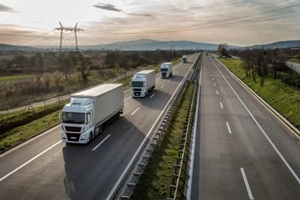
Commercial trucking insurance is an essential requirement for any trucking business, but it’s not a one-and-done solution. As businesses change, their insurance policies should evolve as well. Outdated commercial trucking insurance policies cause businesses to overpay for coverage, fail to protect their drivers and vehicles, or expose them to costly coverage gaps.
This article reviews common scenarios commercial trucking businesses encounter that warrant a reevaluation of their current coverage. Proactive insurance assessments help businesses maintain the coverage they need for their current size, make sure their premiums match their benefits, and limit their exposure to compliance errors and other liabilities.
1. Changing Business Size
Businesses can grow or downsize, but they should always maintain insurance coverage that matches their current situation. Since trucking insurance policies conform to the business’s current structure, they can quickly become outdated when trucks, trailers, or drivers are added or removed from the fleet.
Policies should be scaled back when fleets get smaller to avoid overpaying for coverage that is no longer necessary. This can happen after layoffs, industry changes, a change in business model, or the retirement of old equipment. It’s essential to notify insurers when assets or workflows change to avoid paying for unnecessary coverage. Accurate policies help trucking companies save money while reducing their risk for claim disputes due to insufficient coverage.
2. New Cargo Types
A business’s trucking insurance must match the cargo that it hauls. General freight has different liability limits than refrigerated goods, high-value items, or hazardous materials. For example, while non-hazardous freight has a coverage minimum of $300,000, hazardous materials, such as chemicals or oil, require $5,000,000 or more in coverage.
Another factor to consider is whether the business transports passengers. This will significantly increase the minimum legal liability. According to the FMCSA, vehicles with a capacity for 15 or fewer passengers require $1,500,000 in coverage. Changing cargo types or introducing passenger transports to the fleet can drastically change the insurance the business needs.
3. Regulatory Changes
Changes in local, state, or federal compliance requirements can warrant an insurance reevaluation. For example, the FMCSA could modify the minimum liability coverage requirements for specific cargo or vehicle types. Another example that could become significant in the coming years is the advent of electronic logging devices as a requirement for many commercial trucking businesses. These include safety and surveillance systems as well as speed limiters.

In the past, cars manufactured before a certain year were exempt from these requirements; however, this may change. Failure to recognize these changes and respond with adequate insurance coverage can result in contract disqualification, fines, or even claim denials. Since state-specific requirements also come into play, companies that add interstate cargo transporting to their business model should reevaluate their coverage.
4. After a Recent Claim
Accidents happen, and businesses with adequate insurance coverage can claim covered property damage, bodily injuries, or legal expenses. However, in many cases, a major claim presents an opportunity to reevaluate the policy and determine if broader or more specific coverages, different deductibles, or a higher liability limit might have improved the business’s claim outcome.
In many cases, even a successful claim reveals gaps in a business’s policy coverage. For example, accident insurance may cover the vehicle damage, but if the business lacks downtime insurance, they may not be able to include the cost of equipment downtime in their claim. While businesses may never want to have to file a major claim, it can serve as an opportunity to reevaluate coverage and close any gaps.
5. During the Renewal Period
As policies come up for renewal, many trucking companies opt to auto-renew their current coverage to prevent the hassle of reviewing their coverage. However, this could be a costly mistake. New endorsements, policy structures, or pricing options can dramatically impact a policy’s value.
Additionally, the insurance market changes frequently. New or existing carriers may adjust their criteria to offer new discounts, benefits, or schedules that businesses can leverage. Even a small change to the deductible can have a measurable impact on the policy’s ROI.
6. After a Power Restructuring
Businesses can experience a shift in ownership, a change of partners, or a restructured contract. Any notable change in the business’s ownership model warrants a reevaluation of its insurance profile. Policy misalignment could lead to complications with corporate documents and compliance when trying to pass an audit or file a claim. Even a new equipment lease could warrant renewed coverage or additional endorsements, such as non-owned auto policies.
Partner with a Local Insurance Expert to Keep Your Policy Up to Date

At Pro Insurance Group, our team helps commercial trucking businesses match their insurance coverage to their business’s needs. This includes reevaluating coverage, liability limits, endorsements, and deductibles. Even without a specific event, such as a change in business model or industry regulations, insurance coverage should be reviewed at least once a year to make sure the business pays only for the coverage it needs without leaving costly coverage gaps.
Contact our team of insurance advisors today to learn how Pro Insurance Group can help your business assess, maintain, and update insurance coverage to maintain the protection you need.
